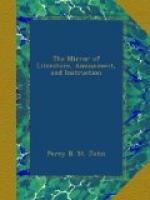About the year 1790, at the Assizes for the county of which the town of C——r is the county town, was tried and convicted a wretch guilty of one of the most horrible murders upon record. He was a young man, probably (for he knew not his own years) of about twenty-two years of age. One of those wandering and unsettled creatures, who seem to be driven from place to place, they know not why. Without home; without name; without companion; without sympathy; without sense. Hearthless, friendless, idealess, almost soulless! and so ignorant, as not even to seem to know whether he had ever heard of a Redeemer, or seen his written word. It was on a stormy Christmas eve, when he begged shelter in the hut of an old man, whose office it was to regulate the transit of conveyances upon the road of a great mining establishment in the neighbourhood. The old man had received him, and shared with him his humble cheer and his humble bed; for on that night the wind blew and the sleet drove, after a manner that would have made it a crime to have turned a stranger dog to the door. The next day the poor old creature was found dead in his hut—his brains beaten out with an old iron implement which he used—and his little furniture rifled, and in confusion. The wretch had murdered him for the supposed hoard of a few shillings. The snow, from which he afforded his murderer shelter, had drifted in at the door, which the miscreant, when he fled, had left open, and was frozen red with the blood of his victim. But it betrayed a footstep hard frozen in the snow, and blood—and the nails of the murderer’s shoe were counted, even as his days were soon to be. He was taken a few days after with a handkerchief of the old man upon his neck. So blind is blood-guiltiness.
Up to the hour of condemnation, he remained reckless as the wind—unrepenting as the flint—venomous as the blind-worm. With that deep and horrible cunning which is so often united to unprincipled ignorance, he had almost involved in his fate another vagrant with whom he had chanced to consort, and to whom he had disposed of some of the blood-bought spoils. The circumstantial evidence was so involved and interwoven, that the jury, after long and obvious hesitation as to the latter, found both guilty; and the terrible sentence of death, within forty-eight hours, was passed upon both. The culprit bore it without much outward emotion; but when taken from the dock, his companion, infuriated by despair and grief, found means to level a violent blow at the head of his miserable and selfish betrayer, which long deprived the wretch of sense and motion, and, for some time, was thought to have anticipated the executioner. Would it had done so! But let me do my duty as I ought—let me repress the horror which one scene of this dreadful drama never fails to throw over my spirit—that I may tell my story as a man—and my confession at least be clear. When the felon awoke out of the deathlike trance into which this assault had thrown




